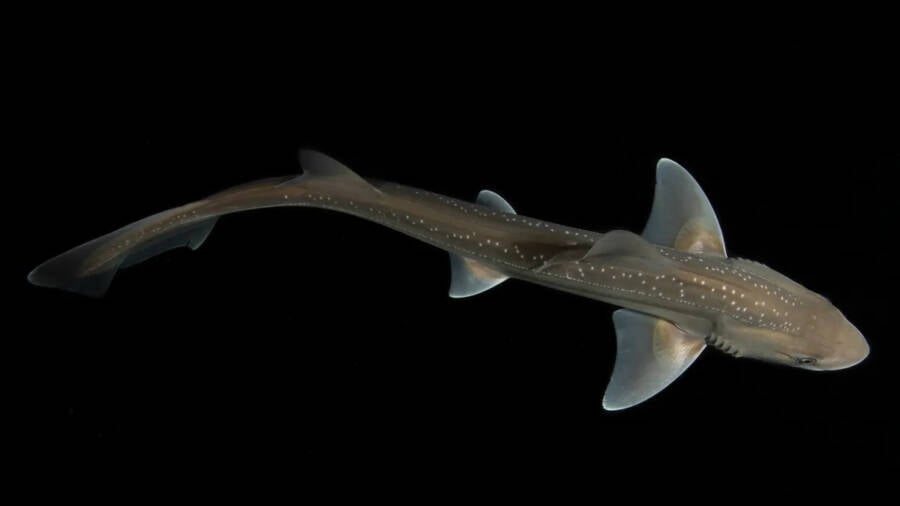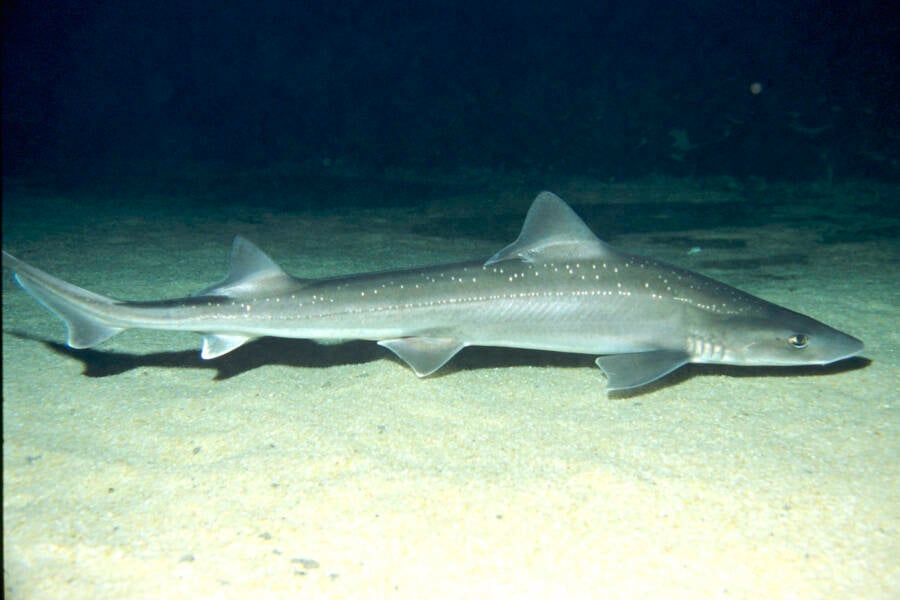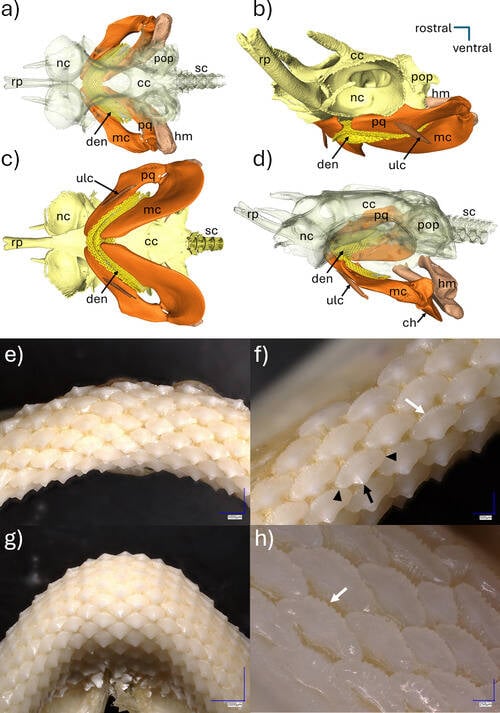Researchers in New Zealand recently captured audio of rig sharks making clicking noises — the first recordings of shark sounds in history.

Paul CaigerScientists captured history’s first-ever recordings of shark sounds from rig sharks like the one pictured here.
A team of researchers in New Zealand that was recently conducting tests on sharks never expected to make history — and capture the first recordings of shark sounds ever made.
While examining various shark species’ hearing capabilities, researchers noticed strong clicking noises made by rig sharks. Though an analysis of the sharks’ anatomy did not identify any sound-producing organs, the team hypothesized that the species uses its unique teeth and jaws to deliberately create fast-paced, loud clicking noises.
Further testing is now ongoing to uncover the purpose of these shark sounds and see if this ability is unique to rig sharks, or is perhaps something all sharks are capable of. Either way, the findings have unveiled new information about one of the world’s most fascinating ocean predators and given the scientific community a new answer to the question “do sharks make noise?”
Can Sharks Make Sounds? Scientists Now Say Yes — And Have Recordings To Prove It
Between May 2021 and April 2022, Carolin Nieder, a marine biologist and Ph.D. student at the University of Auckland in New Zealand, conducted a research project focused on the hearing capabilities of several shark species.
While working with rig sharks, a species commonly found in estuaries near the coast of New Zealand, Nieder and her team noticed that the sharks would start to make crackling sounds when handled:
“At first we had no idea what it was because sharks were not supposed to make any sounds,” Nieder said, according to Scientific American. “I remember coming home and just thinking more and more about how weird those sounds were.”
As detailed in their study, now published in the journal Royal Society Open Science, Nieder and her colleagues placed 10 juvenile rig sharks into tanks with sound recorders. The researchers held each shark, one at a time, for 20 seconds to gather ample recordings of the clicking sounds.
Each click lasted roughly 48 milliseconds — faster than the blink of a human eye — and occurred in frequencies ranging from 2.4 to 18.5 kilohertz. The volume of the clicks reached as loud as 156 decibels, about as loud as a balloon pop, or even a shotgun blast. Around 70 percent of these clicks were made while the shark engaged in a swaying motion.
All 10 of the rig sharks in the experiment made these clicking noises upon being handled, although their frequency decreased with further handling, indicating that the noises may have been distress calls that abated once the sharks became more comfortable with the humans and less fearful.
According to Nieder, these calls may be made by adult rig sharks when they think they are in danger, serving as a warning to nearby juvenile sharks to make a quick escape.
However, researchers have also noted that the frequency of the clicking sounds falls outside of the detectable limit for sharks. So if sharks can’t even hear the sounds they’re making, then it’s more likely that the clicking sounds are not to warn other rig sharks, but instead meant to scare off the animals that hunt them.
Regardless, the pattern and frequency of the clicks strongly indicate that they are intentional.
“As the animals got used to the daily experimental protocol, they then stopped making the clicks altogether, as if they got used to being in captivity and the experimental routine,” Nieder told CNN. “This led us to consider that maybe we are observing a sound making behavior rather than a strange artifact.”
However, one question remained: How were the sharks making these sounds?
How Are Rig Sharks Producing These Noises?

NIWAScientists have just changed their answer to the question “do sharks make noises” after recording sounds made by rig sharks like this one.
For years, the scientific community believed that it was simply a proven fact about sharks that they were mute. Unlike other fish species, they do not possess a swim bladder, a gas-filled organ that keeps fish buoyant and produces vocalizations.
However, other types of cartilaginous fish, rays, and skates have been recorded making sounds, particularly when startled. While sharks and stingrays evolved separately beginning 200 million years ago, it is possible that both species maintain this ability to produce sounds today.
In order to confirm that rig sharks did not possess some hidden sound-producing organ, Nieder and her team conducted MicroCT scans and 3D reconstructions of the rig shark’s anatomy and found nothing that could explain the clicking.
With all obvious options exhausted, the team hypothesized that the clicking noises were the result of the shark smashing its teeth together.
The species features a series of tightly-packed, blunt teeth capable of crushing hard-shelled prey like crabs. It is possible that the snapping of the jaws also produces the clicking sound that Nieder and her team recorded.

Nieder et al./R. Soc. Open Sci.Images and scans of the rig shark’s jaw and teeth, believed to be the source of the sounds.
While Nieder and her colleagues’ research has provided the world with the first-ever recordings of shark sounds, there is still more research to be done. After all, questions remain about whether the sharks make these clicking sounds in the wild, whether all sharks are capable of these noises, and most importantly, what the purpose of these sounds is.
Nieder and her team plan to conduct more research, this time with other shark species, to get to the bottom of these strange shark sounds.
“I think there is a chance other sharks are making similar noises,” Nieder told CNN. “This documentation could help [us] start listening to sharks, and maybe we can learn more interesting things.”
After reading about these newly-uncovered shark sounds, dive into the story of the Megalodon, the biggest shark to ever live. Then, read about the sinking of the USS Indianapolis during World War II, the biggest shark attack case in history.





